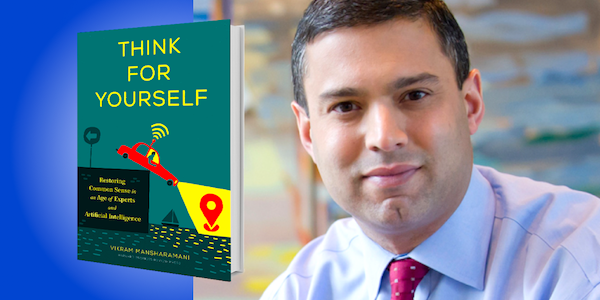Are you sometimes intimidated when asked to make an important decision? Do you question your ability to make that decision? Do you too often defer to experts over your own knowledge and experience?
These are important questions surfaced by Vikram Mansharamani, the author of a new book titled Think for Yourself: Restoring Common Sense in an Age of Experts. Vikram is a current lecturer at Harvard and previously held the same position at Yale. He also advises and consults with Fortune 500 companies on managing dynamic change.
In a “book talk,” sponsored by the Next Big Idea Club, Mansharamani shares five key insights from Think for Yourself, which I’ve shared with a few quick thoughts below.
Insight One: We’ve outsourced too much of our thinking
The author notes that – unlike artificial intelligence – humans are not “robotic, calculating machines” driven by algorithms. Instead, we know we’re fallible and we become intimidated by the need to be absolutely certain. This creates anxiety, according to Mansharamani, and too often tips the scale toward “experts.”
Insight Two: Learn how to manage experts
Mansharamani doesn’t suggest avoiding experts. Instead he believes we should listen to their advice and help while at the same time not giving up our authority to be the final decision-maker in our own lives and professional work.
Insight Three: Get multiple perspectives to avoid biases
Closely linked to the second insight, the author suggests triangulating the advice gained from experts. He reminds his listeners of the parable of the seven blind men and the elephant (one feels the leg and concludes it is the trunk of a tree; another feels the tail and speculates it is a snake, etc.). Decision-makers should seek the advice of multiple sources and try to connect the dots. Having a devil’s advocate can also help avoid biases.
Insight Four: Mindfully manage our focus
Mansharamani uses the metaphor of a coin when describing the advice of experts. One side of the coin represents narrow and focused thinking. The other side is broader and may ignore the whole picture. What should we do then? The author suggests taking a balcony view and considering who is “shining the spotlight” and what’s the thinking behind that particular advice. More specifically, asking perceptive questions about the recommendations you receive can improve your decision-making process.
Insight Five: Embrace fresh eyes
Novices look at a problem with new eyes, often avoiding the confirmation bias that experts experience. Have trouble assuming a novice perspective? Ask a novice you trust to examine problems and solutions.
Mansharamani’s advice reminded me of the book Range by Daniel Epstein. You can read my review of that book here. Epstein agrees with the use of novices and notes scientific teams that are the most successful are comprised of a collection of people possessing a variety of expertise and outlook. In fact, studies found that often “the further the problem was from the solver’s expertise, the more likely they were to solve it.”
Epstein adds, “Knowledge is a double-edge sword. It allows you to do some things, but it also makes you blind to other things you could do.” (pp. 178-179)
Value Yourself While You Listen to Others
So the next time you are faced with an important decision, factor in the advice of others, but don’t discount your own judgment as well. Mansharamani’s five steps might help you balance external advice with your own wisdom, experience, and judgment.
Learn more about this!
You can watch Mansharamani’s video chat – and read the Next Big Idea Club summary of his points – at the Club’s magazine site for free. I have a Club membership and always find the new books, videos and other material stimulating – it’s a great way to make sure I’m always looking forward!



0 Comments on "What We Gain When We Do Our Own Thinking"